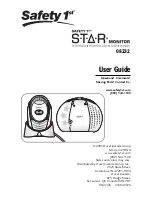
65BDL4052E/75BDL4052E/86BDL4052E
68
13. Cleaning and Troubleshooting
13.1. Cleaning
Caution When Using the Display
• Do not bring your hands, face or objects close to the ventilation holes of the display. The top of the display is usually very
hot due to the high temperature of exhaust air being released through the ventilation holes. Burns or personal injuries may
occur if any body parts are brought too close. Placing any object near the top of the display could also result in heat related
damage to the object as well as the display itself.
• Be sure to disconnect all cables before moving the monitor. Moving the monitor with its cables attached may damage the
cables and thus cause fire or electric shock.
• Disconnect the power plug from the wall outlet as a safety precaution before carrying out any type of cleaning or
maintenance procedure.
Front Panel Cleaning Instructions
• The front of the display has been specially treated. Wipe the surface gently using only a cleaning cloth or a soft, lint-free
cloth.
• If the surface becomes dirty, soak a soft, lint-free cloth in a mild detergent solution. Wring the cloth to remove excess liquid.
Wipe the surface of the display to remove dirt. Then use a dry cloth of the same type to dry.
•
Do not scratch or hit the surface of the panel with fingers or hard objects of any kind.
• Do not use volatile substances such as insert sprays, solvents and thinners.
Cabinet Cleaning Instructions
• If the cabinet becomes dirty, wipe the cabinet with a soft, dry cloth.
• If the cabinet is extremely dirty, soak a lint-free cloth in a mild detergent solution. Wring the cloth to remove as much
moisture as possible. Wipe the cabinet. Use another dry cloth to wipe over until the surface is dry.
• Do not use solution that contains oil to clean the plastic parts. Such product damage the plastic parts and void the warranty.
• Do not allow any water or detergent to come into contact with the surface of the display. If water or moisture gets inside
the unit, operating problems, electrical and shock hazards may result.
•
Do not scratch or hit the cabinet with fingers or hard objects of any kind.
• Do not use volatile substances such as insert sprays, solvents and thinners on the cabinet.
• Do not place anything made from rubber or PVC near the cabinet for any extended periods of time.









































